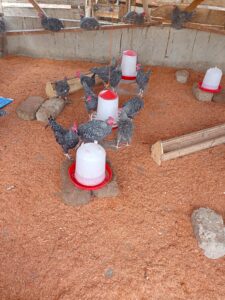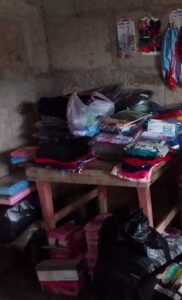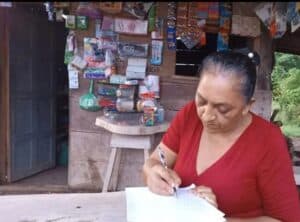
Using Local Resources and a Little Ingenuity to Tackle a Big Problem – Fall Armyworm
Written by Emmanuel Obiri Laryea, Agriculture and Entrepreneurship Program Officer. Edited by Jessica Crawford, Program Specialist for Africa, and Megan Sehr, Development Director.
“John A. Appleman, an American lawyer, poet and encyclopedist wrote that the first ingredient of success is to dream a great dream. Self-Help International’s Agriculture and Entrepreneur Development (AED) team in Ghana can’t agree more – this has been one of the key driving forces behind the success of the people we serve.
Many of the positive developments that we have seen in the lives of the rural farmers with which we partner have been the result of the AED team’s drive to help them increase their yields. We help farmers improve the work they do and help them feel proud of the progress they are making. I would like to share this story about a rural farmer who needed help controlling fall armyworm on his maize farm.” – Emmanuel Obiri Laryea, Agriculture and Entrepreneurship Program Officer

Fall Armyworm.
Farmers in Ghana face a lot of challenges: financial constraints, access to information about good agronomic practices, erratic rainfall, pest and disease control, land use changes, and climate change.
Since 2016, maize farmers in Ghana have been facing an enormous challenge: the invasion of fall armyworm. In 2016 alone, fall armyworm destroyed over 1.4 million hectares [over 3 million acres] of cowpea and maize farms. It became urgent for the country to embark on an extensive education campaign about detecting and controlling it. The government of Ghana through the Ministry of Food and Agriculture, trained farmers and provided pesticides to try to control the outbreak.; however, not all farmers had access to the training and inputs.
Starting in 2018, the AED team has been providing a holistic training on fall armyworm (involving the history, biology, early signs of detection and control, etc.) for rural farmers. So far, this training has been successful. To date (May 2020), no farms that participated in the training have reported fall armyworm infestations.
Fall armyworm doesn’t only swallow a farmer’s crop – it also swallows the farmer’s income. Fall armyworm reduces farmers’ crop yields and the quality of crops produced, which eventually leads to a reduction in their incomes. Even though most farmers have been equipped with the necessary skills and knowledge to control fall armyworm, they are not always able to put all of the practices in action or totally avoid the damage.
Samuel is a 46-year-old farmer who lives with his wife and four children in the village of Bedabour in the Atwima Nwabiagya District of Ghana. Farming is the main livelihood for Samuel and the income he generates is only enough to provide for the basic needs of his family.
He first partnered with Self-Help in 2018. After Samuel saw the bumper harvest from Self-Help’s community demonstration plot, he became more open to exploring new agronomic practices. Samuel reached out to the AED team assistance purchasing some inputs since his income was going toward providing for his family.
The AED team decided to guide him step by step through his farming activities with expected returns and visible economic improvement. When fall armyworm invaded Samuel’s maize farm, he had the knowledge to scout, detect and control fall armyworm . However, Samuel was reluctant to act, and he couldn’t afford to purchase pesticide to control the outbreak. He was waiting for nature to pull a surprise – like many farmers do.
With no way to purchase pesticide, Samuel and AED staff began to look for a solution within the community to address the outbreak. Little did they know that the solution was much closer than they ever imagined.

Making the organic pesticide.
Just beside Samuel’s house was a neem tree (Azadirachta indica) which can be used as a pesticide. AED guided Samuel through preparing an organic pesticide from the neem leaves. Looking at the extent of damage caused by the fall armyworm, AED staff recommended a ratio of 1kg neem leaves to 5 liters of water. Samuel crushed the leaves in a mortar before mixing with water. The mixture steeped until the next day, and then it was filtered to remove leaf residue. Samuel visited his maize farm very early the next morning to apply his neem pesticide.
A week after applying the neem pesticide, Samuel visited his farm and, to his surprise, his maize was free from fall armyworm. He has now harvested his maize and is storing it locally.
When AED staff asked Samuel when he was planning on shelling and selling his maize, he smiled and said that the maize will be sold when prices appreciate enough to earn the money he needs to purchase inputs for the next farming season.

 Previous Post
Previous Post Next Post
Next Post


